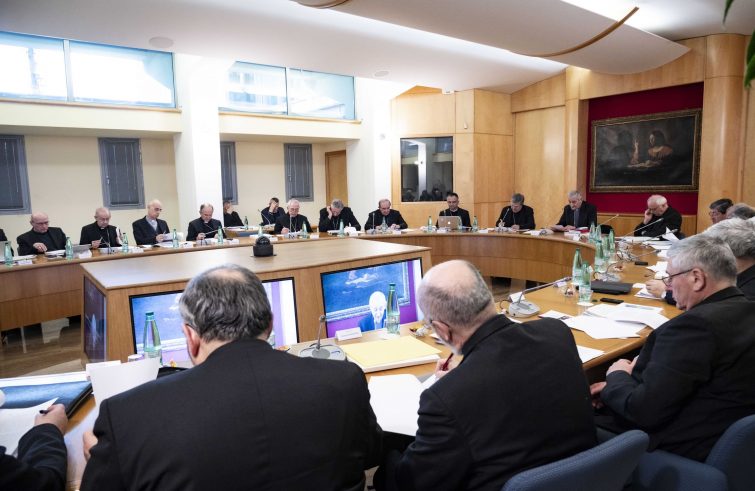
“To recognise with sincerity ecclesial and social difficulties, while trusting that we are approaching a new springtime for the Church, paving the way for new and bold prospects for the future.” This is the roadmap indicated to the Italian bishops by Card. Matteo Zuppi, archbishop of Bologna, President of the Italian Bishops’ Conference, in his opening address to the members of the Permanent Council, taking place in Rome until March 22. “This will require enthusiasm, prophetic vision, Gospel freedom and communion wisdom, generous responsibility and selflessness in service,” continued the cardinal. “Synodality is the opposite of self-denial or levelling down!” he exclaimed. In his opening speech, Cardinal Zuppi cited the ‘winter metaphor’ from his speech at the Permanent Council meeting of 20 September last in the town of Matera, to identify “some of the situations of fragility and suffering of our people today: an environmental winter, a social winter, a winter of territorial disparities, a demographic winter, an educational winter. For some, an irreversible winter.” It is therefore necessary to extend our gaze from “grassroots level”, to “be touched and shoulder the burdens of the poorest among us”, whilst committing ourselves to a “long-term perspective”, for the purpose of “generous and discerning development, with a focus on the future, to communicate the Christian hope that trusts that everything can change, making even the desert bloom. I believe that this is our vision today.”
“The pandemic brought to the fore a number of ecclesial weaknesses”,
His Eminence remarked: in the post-pandemic season, we need not put our efforts in the “delusional and hypocritical quest for perfect communities”, but rather “transform suffering into human and ecclesial awareness and wisdom.” “Looking back at the pandemic period, we must
ensure that the use of digital communication, so important during the period of isolation, does not replace physical presence thereby serving the purpose of individualism and pathological fear”,
the Cardinal cautioned, calling for “an appropriate end to so many digital broadcasts that cause people to close themselves off.” Instead, there is an urgent need “to nourish a Christian culture that gives shape and meaning to ‘being together’”, for, as the Pope says, “it is together, in fraternity and solidarity, that we build peace, guarantee justice, overcome the most painful events.” In short, the season of the pandemic “was the season of the ‘saints next door'”, priests and lay people who “have in fact re-created pastoral ministry that extended beyond the familiar physical and mental boundaries of parishes, with a wealth of solidarity, proximity, and selfless love.”
“Nor can we fail to remember the latest tragedy affecting refugees, whose lives were safeguarded by no one!”
With these words, the president of the Italian Bishops’ Conference referred to the tragedy of Cutro. “I wholeheartedly thank those who came to their rescue, an outpouring of humanity, along with the Church of Crotone, which has shown the Mother face of our Church,” the cardinal’s tribute. His Eminence thus reiterated the appeal addressed in Matera “to politicians, and somewhat to everyone else, highlighting a set of concerns requiring definitive answers – not provisional, precarious, or incomplete. These included: the steady and alarming increase in poverty, the demographic winter, the regional disparities, the ecological transition and the energy crisis, job protection, especially for young people, migrants, overcoming bureaucratic bottlenecks, the reforms concerning the State’s democratic representation and election law. It is indeed a time for courageous choices for everyone. It really is time for everyone to make some bold choices, not motivated by partisan interests.”
“No one should delude themselves into believing that there is an answer to every problem, or that this process is experienced by all with the same enthusiasm”,
he said referring to the synodal path of the Church in Italy, which will be the focus of the next assembly of the Italian Bishops’ Conference. “Those participating in this journey convey their joy at the progress made together, which is gradually leading all those involved to embrace a new pastoral and spiritual style,” said the president of the Italian bishops: “The Churches have given voice to a plurality of players, which I believe is the best way to prepare for the time when necessary and courageous Gospel decisions will have to be taken, involving everyone at various levels, from the individual local Churches, to the ecclesiastical Regions, to the Church in Italy as a whole, and to the Italian Bishops’ Conference (CEI) in its entirety. I think it is necessary not to miss out on the thrust of vitality and creativity, which gave rise to new pastoral practices in form and content during the pandemic.”
“The post-pandemic Church and the Synodal Path are increasingly becoming a missionary Church,
for individual calling and mandate, measured in terms of questions, challenges, and the need to spread a Christian culture as key for understanding and consolation in the face of so much suffering”, Zuppi’s description: “The pandemic abruptly confronted everyone with some fundamental existential questions, such as the meaning of death, the reason for the suffering of the innocent, the wholly human value of life from its beginning to its natural end, the importance of self-giving, and human fragility. I like to imagine a Church that will tackle these questions and offer light and hope for new motivations that free us from fear.” In conclusion, a heartfelt “thanks” to Pope Francis, on the occasion of the tenth anniversary of his pontificate: “His words and his gestures have become an ecclesial agenda for us, offering us a language that draws many people closer and is comprehensible by all.”










